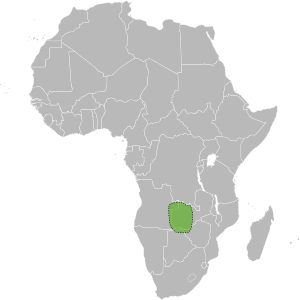Kololo people facts for kids
The Kololo or Makololo are a group of people from Southern Africa. In the early 1800s, the Zulu forced them to leave their homes. They moved north to Barotseland in Zambia.
The Kololo took over the land of the Luyana people. They made the Luyana speak their language. Over time, the Luyana and Kololo languages mixed. This created the Lozi language that is spoken today. The Lozi people are descendants of the Luyana and other nearby tribes. In 1864, the Kololo kingdom was defeated. Some Kololo chiefs then moved to Chikwawa District, Malawi, with David Livingstone.
Contents
What's in a Name?
The Kololo are also known as Makololo. When you talk about many Kololo people, you can say Bakololo. The "Ba-" part is a special prefix in Bantu languages. It means "people."
There are two main ideas about where the name Kololo came from. One idea is that they were named after Kololo. She was the wife of their first chief, Sebitwane. Another idea is that it's a word from the Luyana language. It might mean "bald," referring to how the Kololo warriors styled their hair.
A Journey Through History
The Kololo people first lived in what is now the Free State province of South Africa. In the early 1800s, the powerful Zulu Kingdom expanded. This forced the Kololo to leave their homes.
In 1823, the Kololo began a long journey north. They traveled through Botswana towards Barotseland. Along the way, they won battles against some groups. But they also faced big defeats. In 1826, they lost many cattle to the Bangwaketse people.
After losing their cattle, they moved northeast. They raided other groups to get supplies. More defeats pushed them north to the Okavango Delta. Here, they suffered more losses. But in 1835, they defeated the Batawana people. This victory helped them get more people and cattle. After a few years, they moved even further north.
The Kololo Kingdom
In 1838, the Kololo leader, Sebetwane, crossed the Zambezi River. By 1845, he had conquered the Lozi people of the Barotseland kingdom. Sebetwane became their king.
He died in 1851, soon after meeting David Livingstone. His daughter, Mamochisane, became queen. But she soon gave up the throne to her younger half-brother, Sekeletu. After about 20 years, the Kololo kingdom was overthrown. However, some Kololo survivors, mostly women and children, remained.
Livingstone and the Kololo
Sekeletu helped David Livingstone a lot. He gave him many porters for his long journey across Africa. This journey went from Luanda on the Atlantic Ocean to Quelimane on the Indian Ocean. It happened between 1854 and 1856.
About 100 of these Kololo men stayed in Tete, Mozambique in 1856. Livingstone then went to Quelimane and later to Britain. Livingstone returned to Africa in 1858 for his second Zambezi expedition. He met the porters he left in Tete. He tried to send them all back to Barotseland.
However, Sekeletu was facing problems from the Lozi people. About 16 of the Kololo porters decided to stay in the middle Zambezi area.
New Homes in Malawi
From 1859, Livingstone and missionaries used these Kololo men. They worked as porters and armed guards. They helped with activities in the Shire valley and Shire Highlands. This included freeing slaves. They were paid with guns, ammunition, and cloth.
The Kololo decided to stay in the Shire valley when the missionaries left in January 1864. The missionaries left behind supplies of weapons. The Kololo used these to hunt elephants for ivory. Many people, including freed slaves, came to them for protection.
The Kololo and their armed followers set up chieftaincies. These are areas ruled by chiefs. They are in the present-day Chikwawa District. Originally, ten Kololo men became chiefs or headmen. Today, five Makololo chiefs still exist in that area.
See also
 In Spanish: Macololo para niños
In Spanish: Macololo para niños
 | Delilah Pierce |
 | Gordon Parks |
 | Augusta Savage |
 | Charles Ethan Porter |


